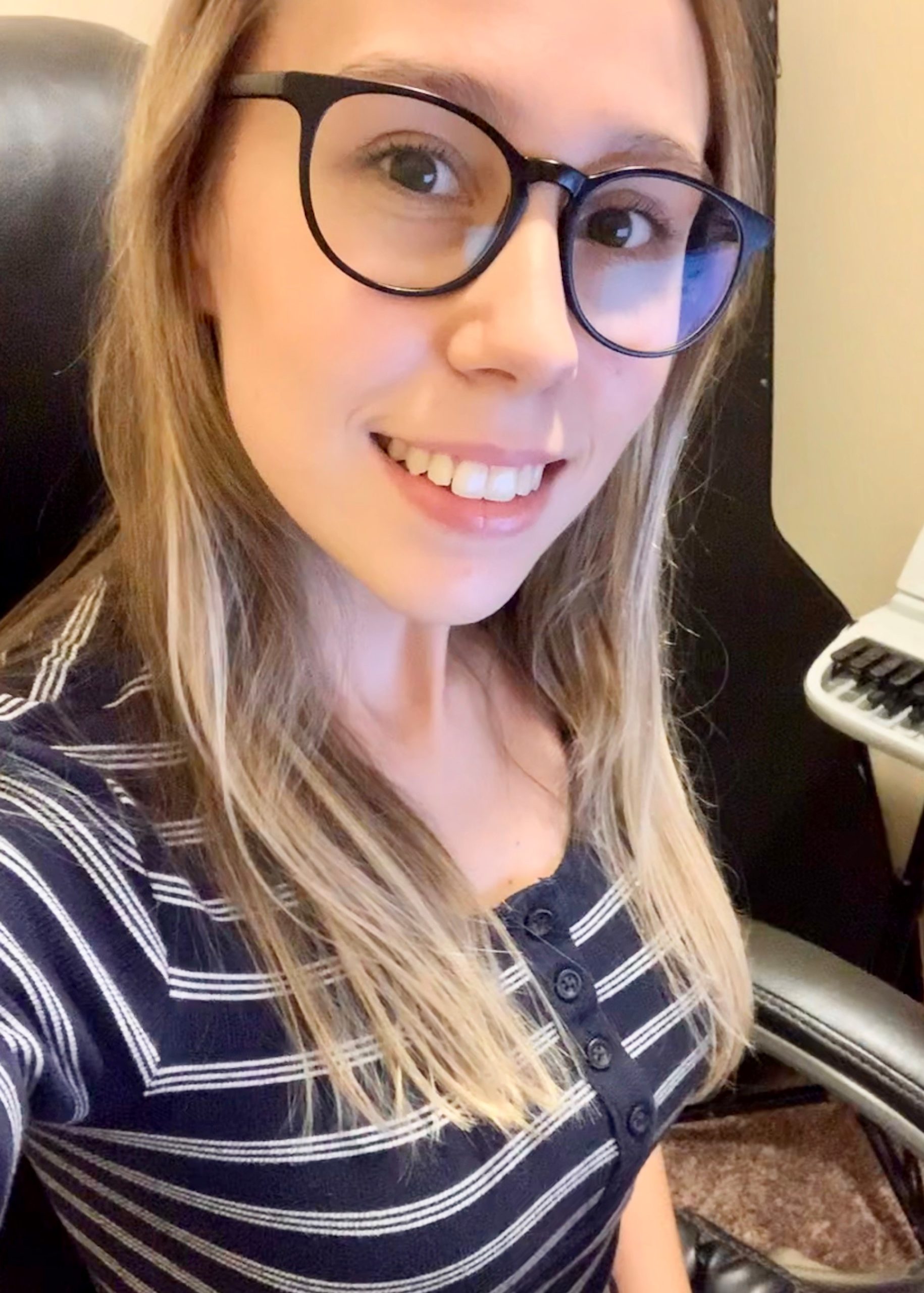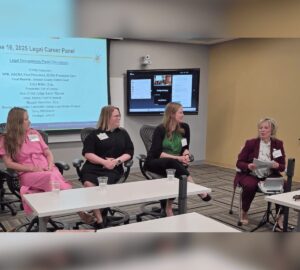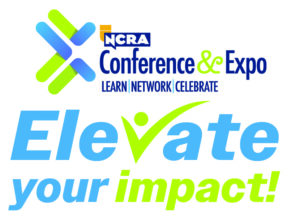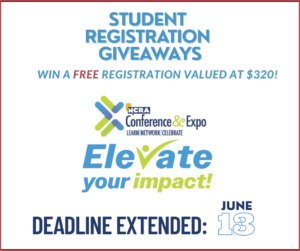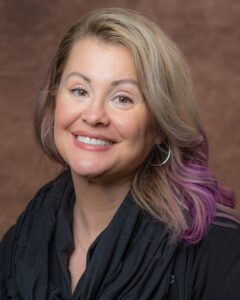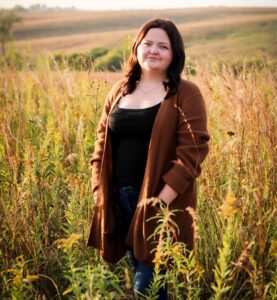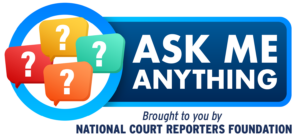Erin Blair, an online student from West Des Moines, Iowa, just passed her Registered Skilled Reporter (RSR) exam, and she has some advice for young people looking for a great career. “To me, a career in stenography is taking control of your life by working for yourself, taking breaks and vacations when you need to, and improving your skills to create your own upward mobility without having to rely on anyone else for it,” she says. “I think a lot of high school kids want all of those things and just don’t know that stenography is the key to that.”
UTS | Can you talk a little about your background? How did you first get the idea of being a court reporter?
EB | I started going to school to be a court reporter in August 2020. I’ve always had a strong interest in legal studies and English. My mom was a title researcher who often went to courthouses to get records, and she mentioned it to me in passing when I graduated from high school because I didn’t know what I wanted to do, and I didn’t want to take on student debt. I did a semester at a community college immediately after high school and hated it, so I just entered the workforce. Then around April 2020, I had burned out of my previous career choice and decided to look into steno school. I was so excited to find an intersection of my love of English and legal studies. A big fear that prevented me from committing to secondary education earlier was the fear that I could be stuck with something I hate and paying a mountain of student debt. Court reporting eased all of those worries for me.
I was so excited to see that there were opportunities in depositions, officialships, captioning, CART, and even teaching. I enrolled at my first school, Des Moines Area Community College (DMACC) in Des Moines, Iowa in August 2020, which gave me a terrific theory foundation and excellent core education from Sarah Bowers, RPR, and Patti Ziegler, CRI, CPE. They are incredible instructors, and it was such a privilege to learn from them. The school went back to in-person instruction in the fall of 2021, so I decided to change schools. I stayed at DMACC until August 2021, at which time I transferred to SimplySteno starting at 110 wpm. While I loved my first school, I’m so happy I made the switch. Marc Greenberg, CRI, is a phenomenal instructor who has really created a special, structured online program that fosters community and positivity. I’m now working on 225 wpm and hoping to graduate and start working this summer.
UTS | Did you have another career before you started at SimplySteno?
EB | Just before I started court reporting school, I was a bartender for several years, and before that, I was doing a series of customer service jobs, including working as a shoe salesperson, a barista, a cell phone salesperson, an internet repair representative, and a computer salesperson.
UTS | You were involved in the recent “I Have a Dream” Steno Project Collaborative headed up by Margary Rogers, RPR, CRI, an official court reporter from Washington, D.C. Can you tell us a little about that?
EB | I’m so glad you’re asking me about this. I met Margary through a steno Facebook group that she runs called Steno Fitness Challenge. We connected through that group, and then I saw that she was organizing the “I Have a Dream” project. I decided to be a part of it because Dr. Martin Luther King Jr. is a true embodiment of standing for justice. As a future guardian of the record, I naturally admire anyone who stands for justice. It was really great to be included as a student in such a thoughtful, beautiful project among very respected stenographers including NCRA President Debbie Dibble, RDR, CRR, CRC, from Salt Lake City, Utah.
UTS | What is the best advice you’ve been given so far?
EB | When I went to my first NCRA Conference last year, I met Michael Solorzano, RPR, CRR, a freelance court reporter from Los Angeles, Calif., and he told me to say no to people who don’t pay my bills. What an incredible nugget of advice this turned out to be for me! I felt I already had a fairly solid practice ethic, but this advice made me double down on my commitment to my practice schedule.
UTS | What are your plans for when you finish school? What is your dream job?
EB | Just this month I passed my RSR examination and will be applying for my Washington state license through reciprocity. I’m still going to continue schooling until I pass 225 wpm. My plans right out of school are to be a freelance deposition reporter, and then I want to start transitioning into CART/captioning as my skills improve. I was so inspired by hearing about Isaiah Roberts, RPR, and Stanley Sakai pitching captioning services to Coachella and then providing the captions. I would love to develop that same entrepreneurial spirit to increase accessibility through stenography.
UTS | If you were to go to a high school career fair to recruit students, what would you say to them about a career in court reporting and captioning?
EB | I would tell them about Isaiah and Stanley, actually. I would tell them that you can caption your favorite music artists with this skill, you can get paid to watch sports and write the action as it’s happening, and you can travel the world taking down testimony that will impact million-dollar settlements. I think a lot of high schoolers are keenly aware of what their parents went through, just trudging through a 9 to 5 so they can retire and “finally start living.” To me, a career in stenography is taking control of your life by working for yourself, taking breaks and vacations when you need to, and improving your skills to create your own upward mobility without having to rely on anyone else for it. I think a lot of high school kids want all of those things and just don’t know that stenography is the key to that.
I would also share that as an LGBTQ+ person with chronic mental health problems, when I started getting into stenography, I was worried that because of the nature of the field I wouldn’t be welcomed or accepted for who I am. I was worried that I would need to conceal parts of myself to thrive in this field. I’ve never been part of a career field that has been so diverse and so welcoming to people from all walks of life. If you’re a weirdo like me, this career is for you too, and WE NEED YOU!
UTS | What do you do when you aren’t studying?
EB | My first love is music. I’m a singer-songwriter. I sing and I play multiple instruments including clarinet, tenor saxophone, piano, and a little bit of guitar. My significant other is a percussion teacher, and I’d love to get into playing music with him in some way after I finish school. I can’t wait to get back into reading books when I have a little more time to do it, and I especially love autobiographies. I also love running and yoga as well, and I’ll be the first to tell you that fitness is a big part of bringing your best self to the steno machine. Everything is connected!
